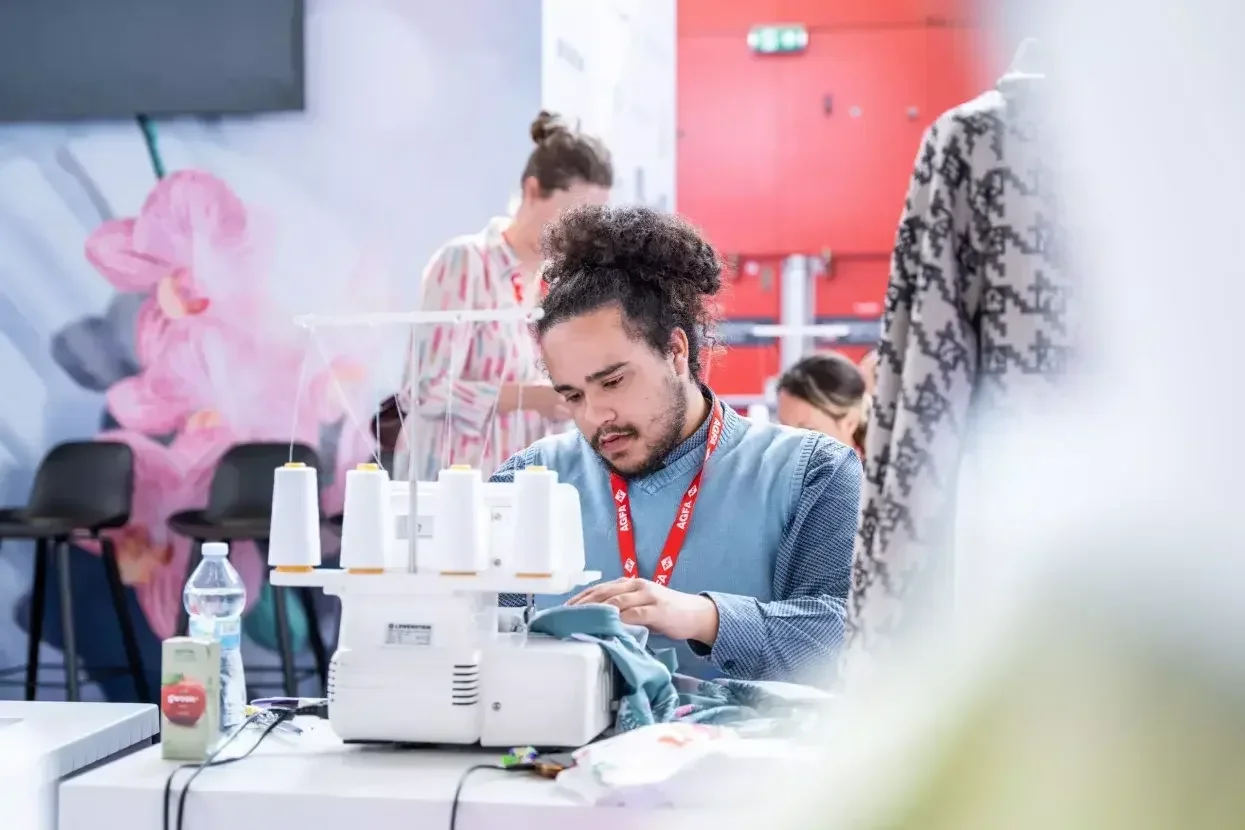
FESPA’s Textile Ambassador, Debbie McKeegan speaks to industry specialists at Personalise Make Wear at Personalisation Experience and Sportswear Pro 2024 held in Amsterdam. Each day of the exhibitions Debbie hosted a fire-side chat with these specialists to discuss various industry topics. During this Fire-side chat with Antigro, Caldera, Print Logistics, Inkcups and Kornit Digital they discuss the role of digital technologies in personalisation, reshaping the supply chain, the future of manufacturing and more.
Held at the recent FESPA Global Expo in Amsterdam, the “Personalise Make Wear” feature showcased a live custom-built, end-to-end Smart Factory that manufactured customised, personalised sportswear on-demand. The feature signposted the future of manufacturing as the industry shifts to sustainable, environmental production.
During the show exhibitors and industry experts worked side-by-side to explore and demonstrate the disruptive, transformative technologies now available for digital manufacture. Hosted by FESPA Textile Ambassador, Debbie McKeegan visitors were able to join and experience expert tours and live demonstrations from the many industry experts and application specialists on-site for the duration of the show.
Each day specialists gathered at 13:00pm for a Fire-side chat. The excepts below detail the first of four conversations hosted by Debbie McKeegan with Personalisation Make Wear partners, special guests and exhibitors in residence.
The insightful discussion titled: The Smart Factory and Customisation Technology Explored” asked What makes a factory smart? Offering a dive deep into the fabric and function of an on-demand factory built for the manufacture of personalised products with key experts from the PMW feature.
Listen to the accompanying 25 minute audio podcast here.
Special guests
- Ross Newens – Co-Founder, Print Logistic
- Sebastien Hanssens – Vice President Marketing and Operations, Caldera
- Bobby Grauf – Managing Director, Inkcups Europe
- Itamar Bartana, Product Marketing Director, Kornit Digital
- Marcin Majda – CEO, Antigro Designer
The Smart Factory Decoded
The smart factory offers a manufacturing platform that encompasses digital technologies, print automation, and seamless workflows for on-demand production and direct customer delivery. Each element of smart production technology whether RIP software, digital print manufacturers, automation systems, or workflow management collectively crafts a seamless smart factory that operates using “one language”.
Print Logistic, a smart manufacturing hub based in Poland, has taken automation to the next level by developing proprietary software to streamline the entire production process. Ross Newens stated: “The transformation to smart factories is a direct challenge to traditional supply chain models, pushing the boundaries of on-demand for scalability and efficiency”.
Role of Digital Technologies in Personalisation
Digital technologies are undeniably transforming various sectors, and manufacturing is no exception. Frontrunners like Print Logistic, Kornit Digital, Caldera, Antigro and InkCups now leverage these innovative technologies to unleash a new era of personalisation in textile manufacturing. Kornit Digital are championing the cause of sustainable manufacturing with one-step solutions for digital textile printing. Antigo is carving a niche with advanced tech for mass customization and high-value personalisation, driving improved profit margins for clients. Caldera is ensuring the finest reproduction of designs with colour management technologies and RIP software. Inkcups is revolutionising personalisation on cylindrical products using digital, print solutions.
Reshaping the Supply Chain
Digital technology adoption, coupled with personalisation, is reshaping the conventional supply chain. Pioneers like Print Logistic signpost a supply chain overhaul by offering on-demand production and direct to customer delivery. The irreversible digital wave is encouraging a shift from the traditional supply chain, known for its elongated lead times and poor environmental process, towards the scalability that digitisation and smart factory’s’ deliver.
Adopting digital technologies and automation can make the supply chain more agile, responsive, and customer-centric, leading to significant cost savings and sustainable operations.
Bridging the Gap
The key to successful digital transformation lies in education and bridging the existing knowledge gap in the industry. Giants like Kornit Digital are raising awareness about the digital potential, its cost efficiency, and the ensuing sustainability. They’re also developing modular solutions for seamless tech upgrades. Similarly, Caldera is committed to knowledge sharing, offering online resources to train printers in using their technologies effectively. It is vital to empower printers with the right skills and knowledge to deliver superior personalised products.
The Future of Manufacturing
The conversation concluded with a forward-looking glance towards the role of AI and machine learning. These emerging technologies are poised to bring transformative changes in the manufacturing industry. The prospect of a future where personalised and customised products are commonplace was posited as an exciting, fast-approaching reality.
In summary, the conversation at FESPA’s “Personalise Make Wear” showcased the tremendous potential and rapid advancements in the manufacturing industry. The future of digital manufacturing promises a world of customised production, streamlined process, and smart high-tech hubs.